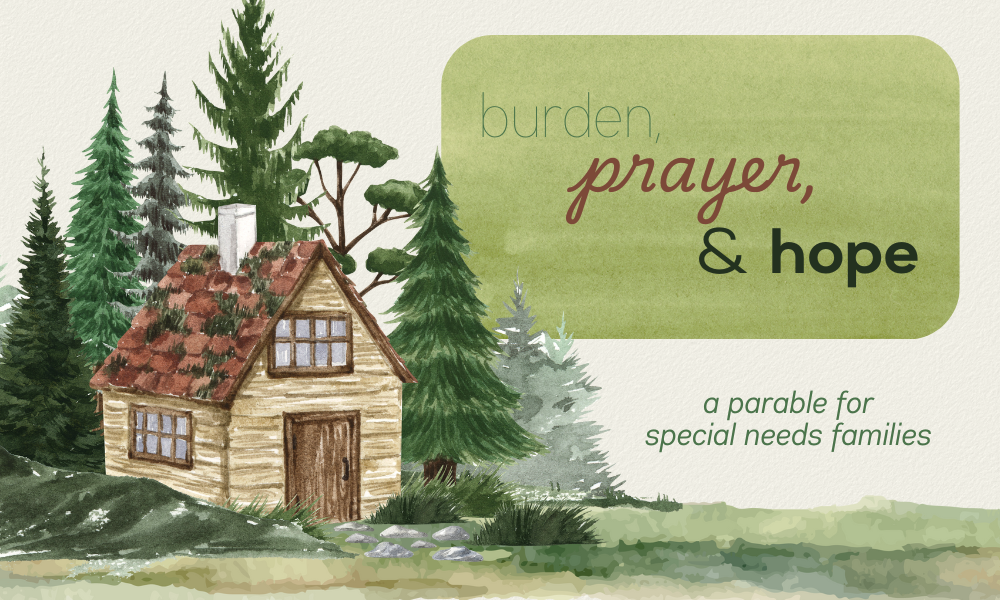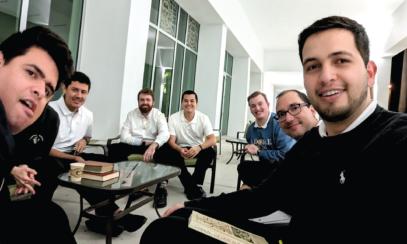
A special-needs family parable
KEY TAKEAWAYS
- Special needs parents carry heavy burdens
- Bring your sorrow to Jesus when disappointed by experts, systems, loved ones
- God works with whatever faith we offer, even when we feel spiritually inadequate
- You are not alone in raising a special needs child
KEY TAKEAWAYS
- Special needs parents carry heavy burdens
- Bring your sorrow to Jesus when disappointed by experts, systems, loved ones
- God works with whatever faith we offer, even when we feel spiritually inadequate
- You are not alone in raising a special needs child
In the Gospel of Mark, we meet the father of a young man possessed by a demon (9:17-27), and the man is distraught over his son's condition. Those of us with a special needs child can appreciate this passage in a way that most folks cannot.
You are not alone in raising a special needs child — Christ walks with you, understands your struggles, and offers hope.
The boy has lived since birth in a state of danger. His affliction causes him to throw himself into fire and water. For most, it would be hard to imagine what life must have been like for the boy's father. He spent years ever vigilant, worried that his son's life could be in peril in an instant.
Simple everyday events can often hold life-threatening consequences for a special needs child. There are parents in your community and parish who live with some form of this distress every minute of every day. It is a burden any parent would bear in loving silence for their child. But ask any special needs parent and you find that the true anguish, when present, is always for their child.
So here is a father who has had to protect his son from injury for years. What he does is symbolic and instructive for us all. He comes to Christ. We all should.
The father had at first asked the disciples to heal the child. "I asked your disciples to drive it out, but they were unable to do so" (9:18). Parents can be disappointed, frustrated and angered by HMOs, insurance companies, "experts" and even friends and family. The more we experience the reality of the inability of others to meet the needs of our child, the more we learn this basic lesson: The only true rock on which we can hope is Christ.
The passage is more about Christ's powerful grace than about the weakness of the disciples or the man. We know that the disciples were sometimes lacking in faith and understanding while Jesus formed them. We know too that we are weak like the man in the passage.
Our Judean father has no time for niceties and pleasant conversations. He simply states his needs and makes an implicit act of faith. Why would he ask of Christ something the apostles could not do? Bear in mind that in this story, people do not know Jesus as Messiah yet. In the face of disappointment, the man perseveres and brings his burden to Christ; this is an act of faith.
And Christ's reaction no doubt makes the father uneasy: "O faithless generation, how long will I be with you? How long will I endure you?" (9:19). This lament is not a sign of encouragement, and the man begins to experience that sinking feeling in his heart. He knows disappointment well.
Jesus' next words to bring the child forward replace fear with hope, while immediately the boy is thrown into a horrible fit — convulsing, writhing and foaming. Again, just imagine the father. His hope is once again replaced by too familiar fear, and this emotional roller coaster is a common sensation for special needs parents.
"But if you can do anything, have compassion on us and help us" (9:22).
This is a plea from a desperate man; a plea from one who has known disappointment too often; the plea of a father who is tired to his bones fighting to protect his son. Unknowingly, it is his second prayer. The man utters a sublime truth about Christ. He recognizes that merciful love is at the core of every act of our Savior. This utterance expresses a fundamental understanding of the essence of God: mercy and love.
Jesus tests the man's faith one last time. Of course he can heal the boy; of course he is full of mercy; yet Christ challenges the man to have faith. He even seems to make the son's cure dependent on the man's faith. The man must ask himself: "Do I believe?"
We know who Christ is. We know the reason we have hope in him and know him as Messiah. Despite knowledge far surpassing this Judean father's, how often do we ask ourselves the same question? This is a crisis of faith that nearly everyone experiences. It is by this trial that most of us are brought to a deeper love and knowledge of God.
When the father's hopes appear in jeopardy, he cries out in desperation, unwilling to give up this promise, this chance for his son's good. "I do believe, help my unbelief!" (9:24)
In his moment of crisis — sheer terror at the thought of what could be and the idea that healing is slipping out of reach — the Holy Spirit intercedes and prays for the man in words he surely could not have thought, flying to his aid and rescuing the man from his own human weakness (see Rom 8:26).
We learn that while we are challenged to have great faith, God can work with however much we are able to offer. This Judean father comes face to face with his own spiritual inadequacy and admits to it; he is saved and his prayers for his son are answered. He experiences mercy at the moment of his complete surrender to God's judgment. The man is most true to himself and reaps the reward he sought for his son when he offers pure trust and total dependence.
The Good Shepherd does heal the boy by driving the demon away. Christ takes the child by the hand and raises him up, just as he did with the daughter of Jairus (Mk 5:41). Christ has freed all of us from our demons and from the power of sin. He will, if we are faithful, one day take us by the hand and raise us to new life with him. This scene is the foreshadowing of the fate of all his faithful ones.
Raising a special needs child can be frustrating and difficult. It can seem that no one else understands. It can seem like we are alone, even among friends and family, but the Gospel tells us all we need to know. Christ is with us. He understands and he has suffered truly difficult things on our behalf. Our job is to remain focused on Christ, to be faithful, pray and surrender.
Daniel McGuire, Ph.D., teaches theology for the University of Providence and teaches deacon candidates for the Diocese of Charleston. He lives in Hardeeville with his wife Kristen, with whom he has eight children and four grandchildren. Visit danielwmcguire.com.



